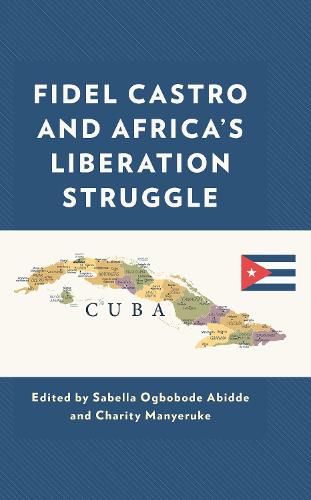Readings Newsletter
Become a Readings Member to make your shopping experience even easier.
Sign in or sign up for free!
You’re not far away from qualifying for FREE standard shipping within Australia
You’ve qualified for FREE standard shipping within Australia
The cart is loading…






The post-1959 Cuban government’s engagement with Africa, which was led by its charismatic and revolutionary leader, Fidel Castro, had two connecting dimensions: military internationalism and humanitarian internationalism. While African states and societies benefited immensely from these engagements, it was Fidel Castro’s military assistance towards the decolonization of and the pushback of Apartheid South Africa that received the loudest attention and ovation in the developing world. Fidel Castro, this book argues, was never motivated by economic, selfish, or geopolitical considerations; but rather, by the altruism and the certainty of his worldview and by the historical connection between the peoples of Cuba and Africa. The principle of international solidary, socialism, and the emancipation of Africa was a much-desired aspiration and attainment. Beginning covertly in Algeria in 1961 and the Congo and Guinea-Bissau in 1964; and more conspicuously in Angola in 1975, Fidel Castro and his socialist government was at the forefront supporting liberation movements in their struggle against colonialism. Defining Castro’s engagement with Africa was his support for the People’s Movement for the Liberation of Angola (MPLA) against the United States-backed Apartheid South Africa, which supported the National Liberation Front of Angola (FNLA) and the National Union for the Total Independence of Angola (UNITA).
$9.00 standard shipping within Australia
FREE standard shipping within Australia for orders over $100.00
Express & International shipping calculated at checkout
The post-1959 Cuban government’s engagement with Africa, which was led by its charismatic and revolutionary leader, Fidel Castro, had two connecting dimensions: military internationalism and humanitarian internationalism. While African states and societies benefited immensely from these engagements, it was Fidel Castro’s military assistance towards the decolonization of and the pushback of Apartheid South Africa that received the loudest attention and ovation in the developing world. Fidel Castro, this book argues, was never motivated by economic, selfish, or geopolitical considerations; but rather, by the altruism and the certainty of his worldview and by the historical connection between the peoples of Cuba and Africa. The principle of international solidary, socialism, and the emancipation of Africa was a much-desired aspiration and attainment. Beginning covertly in Algeria in 1961 and the Congo and Guinea-Bissau in 1964; and more conspicuously in Angola in 1975, Fidel Castro and his socialist government was at the forefront supporting liberation movements in their struggle against colonialism. Defining Castro’s engagement with Africa was his support for the People’s Movement for the Liberation of Angola (MPLA) against the United States-backed Apartheid South Africa, which supported the National Liberation Front of Angola (FNLA) and the National Union for the Total Independence of Angola (UNITA).